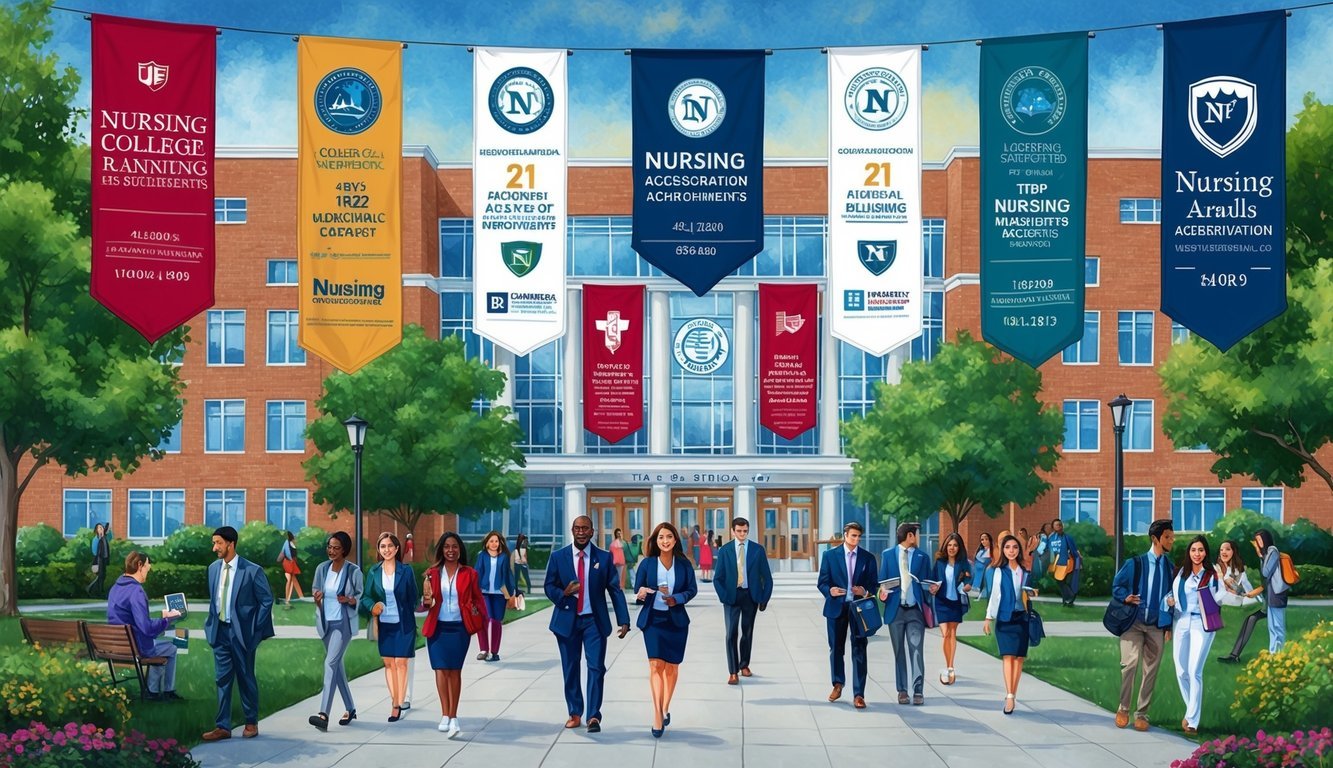If you’re exploring your options for pursuing a nursing career, finding the right nursing college nearby can be essential.
Many reputable nursing schools are available across the country, offering programs tailored to fit your needs as a prospective student.
Whether you’re looking for a bachelor’s program, an RN-to-BSN track, or an advanced degree, local institutions often provide campus tours and guidance to help you make an informed decision.
As you start your search for “nurse colleges near me,” consider checking resources like RegisteredNursing.org and Nurse.org for comprehensive listings of accredited programs.
These platforms not only allow you to search by location but also offer insights into the specific nursing programs available, faculty qualifications, and student support services.
By evaluating your options thoughtfully, you can choose a nursing school that aligns with your career goals and educational needs.
Remember, the right college can set the foundation for a successful career as a nurse, ensuring you’re equipped with the skills necessary to make a difference in healthcare.
Exploring Nursing Schools
Nursing schools offer a variety of programs to meet the educational and career needs of prospective nurses.
Understanding the differences among BSN, RN, and MSN programs can help you make an informed decision about your nursing education.
BSN Programs
A Bachelor of Science in Nursing (BSN) prepares you for a comprehensive nursing career.
These programs typically take four years to complete and include both classroom instruction and clinical practice.
BSN graduates are often sought after in hospitals and healthcare facilities due to their advanced training.
Many programs also offer flexible options, such as online or hybrid courses.
Consider programs that allow for practical experience in local healthcare settings, enhancing your employability after graduation.
Explore schools with strong partnerships in your area, like those listed on RegisteredNursing.org.
RN Programs
Registered Nurse (RN) programs vary in length and format.
You can find options for Associate Degree in Nursing (ADN) programs that usually take about two years.
Alternatively, accelerated BSN programs cater to those who already hold a degree in another field.
Many RN programs focus on essential nursing skills and hands-on training.
If you choose an ADN pathway, you may have opportunities to upgrade to a BSN through bridge programs later.
Investigate local schools that offer paths tailored to your current qualifications.
For more information, check out Nurse.org.
MSN and Nurse Practitioner Programs
Master of Science in Nursing (MSN) programs provide advanced training for nurses seeking specialized roles, including nurse practitioners.
These programs often require a BSN as a prerequisite.
An MSN typically focuses on advanced clinical practice, healthcare leadership, or education.
Duration varies, but it usually takes two to three years to complete.
You will benefit from clinical experiences and research opportunities, enhancing your expertise in patient care.
Prospective students should consider accredited programs that align with their career goals.
For guidance on selecting MSN programs, visit U.S. News.
Ranking and Accreditation

When considering nursing colleges, understanding how rankings and accreditation influence your education is vital.
This section explores how nursing school rankings work and the significance of nursing boards in ensuring program quality.
Understanding Nursing School Rankings
Nursing school rankings are critical in evaluating various programs.
These rankings often consider factors such as graduation rates, faculty-to-student ratios, and NCLEX pass rates.
Using these metrics, you can identify programs that align with your career goals.
For detailed comparisons, refer to Best Bachelor of Science in Nursing Programs or Top Nursing Schools.
The Role of Nursing Boards
Nursing boards play a crucial part in maintaining program standards and ensuring quality education.
They provide accreditation, which is often a requirement for obtaining your nursing license.
This accreditation ensures that the program meets specific educational criteria and prepares you adequately for the workforce.
Accreditation bodies, such as the Commission on Collegiate Nursing Education (CCNE), evaluate nursing programs on strict guidelines.
Programs that achieve this accreditation are recognized nationally, reflecting their commitment to quality.
Understanding these aspects can help you select a nursing program that meets both educational and professional standards.
For more information on accredited programs, visit CCNE Accreditation.
Factors for Student Success

Achieving success in nursing programs relies on specific program features and the availability of support services for students.
Both elements play a crucial role in enhancing academic performance and ensuring a smooth educational journey.
Nursing Program Features
Effective nursing programs typically include a well-structured curriculum that emphasizes hands-on learning experiences.
Comprehensive coursework covers essential topics such as pharmacology, nursing theory, and clinical practices, preparing you for real-world challenges.
Many programs offer simulation labs where you can practice skills in a controlled environment, promoting confidence and competence.
Additionally, programs with strong connections to healthcare organizations may provide opportunities for internships, enhancing your practical experience.
Furthermore, consider programs that focus on diverse learning styles and offer flexible schedules.
This adaptability can make it easier for you to balance your studies with personal responsibilities while maximizing your academic performance.
Support Services for Students
Support services are vital for fostering an environment conducive to learning and personal growth.
Most nursing schools provide academic advising, where you can receive guidance on course selection and career planning tailored to your aspirations.
Many institutions offer tutoring programs or peer mentoring, helping you grasp challenging concepts in your coursework.
Counseling services can also assist in addressing stress management and mental health concerns, which are essential for maintaining your overall well-being.
Finally, engaging with student organizations can bolster your network and provide additional resources.
Student groups often host workshops on essential skills, such as test-taking strategies, time management, and study techniques, all aimed at improving your success in nursing.
By prioritizing program features and support services, you enhance your potential for success in your nursing education.
Online and Hybrid Program Options
You have diverse choices for pursuing your nursing education, including online and hybrid programs.
These options provide flexibility and adaptability to suit your lifestyle while helping you achieve your educational goals.
Benefits of Online Learning
Online nursing programs offer significant advantages.
You can study at your own pace, which allows for better time management between coursework and personal or professional obligations.
Accessibility is another key benefit; online courses enable you to connect with renowned nursing programs from anywhere, potentially broadening your choices.
Many online programs, such as those offering a Bachelor of Science in Nursing (BSN) or Master of Science in Nursing (MSN), use interactive platforms that promote engagement.
Additionally, cost-effectiveness is a factor; often, you save on commuting and housing expenses, contributing to lower overall costs.
Programs like Purdue Global even incorporate lab and simulation experiences at local facilities, enhancing your educational experience.
Hybrid Nursing Programs
Hybrid nursing programs combine online coursework with in-person clinical experiences.
This structure offers you the best of both worlds.
You engage with theoretical content online, while gaining essential hands-on experience during clinical placements.
Institutions like Nightingale College illustrate the effectiveness of this format.
Their 20-month ADN program includes both online and experiential learning opportunities.
This flexibility can be crucial for those balancing work or family commitments.
These programs are ideal for students pursuing various nursing degrees, including BSN and MSN, as they provide rigorous academic training while allowing for local clinical placements.
As a result, you can build confidence and competence in patient care.
Local Nursing Colleges
When exploring local nursing colleges, you will want to consider key institutions that provide comprehensive nursing education and training.
This section focuses on Chamberlain University and nursing schools in Louisville, KY, highlighting what each offers to prospective nursing students.
Chamberlain University Overview
Chamberlain University is dedicated to preparing you for a successful career in nursing.
Located in numerous states, the university offers a Bachelor of Science in Nursing (BSN) program that is designed for both traditional and non-traditional students.
Key Features:
- Accelerated Programs: Options that allow for faster completion, focusing on essential nursing skills.
- Clinical Experience: You will gain valuable hands-on experience through clinical rotations in healthcare settings.
- Support Services: Chamberlain provides career services and academic support to enhance your educational journey.
For more information, visit their official Chamberlain University site.
Nursing Schools in Louisville, KY
Louisville, KY, has several reputable nursing schools that offer diverse nursing programs.
Notable Institutions:
| School Name | Program Offered |
|---|---|
| University of Louisville | BSN, MSN, DNP |
| Spalding University | BSN, Accelerated BSN |
| Jefferson Community and Technical College | ADN, LPN to RN |
These programs focus on preparing you for roles in various healthcare settings.
The University of Louisville offers extensive resources, including advanced simulation labs and community partnerships.
Meanwhile, Spalding University provides hands-on experience early in your education and small class sizes for personalized attention.
For further details, explore the Louisville nursing programs available.

